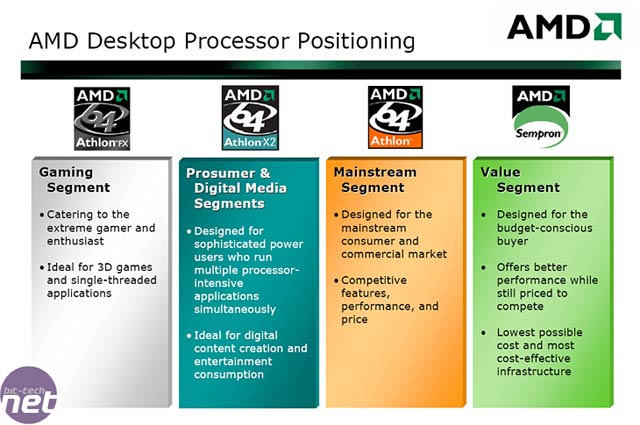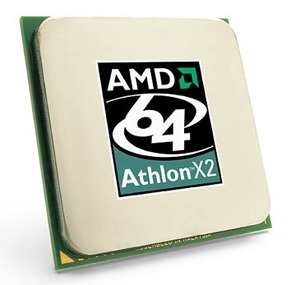There are many things that we have learnt here, and it has become apparent that AMD now has an answer to Intel's HyperThreading technology. While we have focused our preview on the performances of the Athlon 64 X2 against its single cored cousins, we found that there was very little that took the Athlon 64 X2 by surprise.
Dual core is here to stay despite AMD opting to introduce its dual core processors in to the mainstream, before expanding in to the bleeding-edge FX-series processors - maybe this is a sign that AMD have at least one more single-cored FX-series CPU to release before they adopt dual core across the high-end of its Athlon 64 range. The noticeable increase in overall smoothness outweighs the additional performance that you may well see in some applications when using the Athlon 64 FX-55.
The problem here is when you feed the FX-55 with too much pie, it spits it back out at you, while the X2 4800+ appears to be hungry for more and more. It's really hard to explain, but I've never experienced anything like this before, even back in the days of running a dual Celeron system on an ABIT BP6. Everything you do just comes across with an added element of smoothness.
However, based on my wide experiences with the Prescott core, we can assume that the Athlon 64 X2 will be ahead of the Pentium Extreme Edition 840 in single threaded applications. Unfortunately, with not having had the chance to evaluate Intel's Pentium D core yet, we cannot pass comment on how well AMD's Athlon 64 X2 4800+ compares to it in a multi-tasking environment. If you keep in mind the fact that most of us are still in the world of single threaded applications and computing practices, you could assume that the Athlon 64 X2 4800+ looks the most attractive of the pair.
 AMD position the processor for the Prosumer and Digital Media segments but as we have found, it performs adequately to nudge in to the gaming segment that houses the Athlon 64 FX-55, while it will begin to overlap in to the mainstream segment that is currently held by the single cored Athlon 64 processors, such as the 4000+, which sits at the top of that sector.
AMD position the processor for the Prosumer and Digital Media segments but as we have found, it performs adequately to nudge in to the gaming segment that houses the Athlon 64 FX-55, while it will begin to overlap in to the mainstream segment that is currently held by the single cored Athlon 64 processors, such as the 4000+, which sits at the top of that sector.
Dual core processing is the future, but very few of us have a use for it now. However, there are undoubtedly the gang of early adopters who may well benefit from a dual core processor. Hopefully after reading this, you should be able to decide whether dual core is for you. Remember to be realistic, the Athlon 64 X2 is an expensive alternative to the Athlon 64 FX-55 and if you are sensible with your computing habits, you will not find the Athlon 64 FX-55 or 4000+, for that matter, being overstretched by your needs.
There will come a time where a single cored processor will not be enough though, but we don't envisage that happening any time in the immediate future.
Dual core is here to stay despite AMD opting to introduce its dual core processors in to the mainstream, before expanding in to the bleeding-edge FX-series processors - maybe this is a sign that AMD have at least one more single-cored FX-series CPU to release before they adopt dual core across the high-end of its Athlon 64 range. The noticeable increase in overall smoothness outweighs the additional performance that you may well see in some applications when using the Athlon 64 FX-55.
The problem here is when you feed the FX-55 with too much pie, it spits it back out at you, while the X2 4800+ appears to be hungry for more and more. It's really hard to explain, but I've never experienced anything like this before, even back in the days of running a dual Celeron system on an ABIT BP6. Everything you do just comes across with an added element of smoothness.
However, based on my wide experiences with the Prescott core, we can assume that the Athlon 64 X2 will be ahead of the Pentium Extreme Edition 840 in single threaded applications. Unfortunately, with not having had the chance to evaluate Intel's Pentium D core yet, we cannot pass comment on how well AMD's Athlon 64 X2 4800+ compares to it in a multi-tasking environment. If you keep in mind the fact that most of us are still in the world of single threaded applications and computing practices, you could assume that the Athlon 64 X2 4800+ looks the most attractive of the pair.

Dual core processing is the future, but very few of us have a use for it now. However, there are undoubtedly the gang of early adopters who may well benefit from a dual core processor. Hopefully after reading this, you should be able to decide whether dual core is for you. Remember to be realistic, the Athlon 64 X2 is an expensive alternative to the Athlon 64 FX-55 and if you are sensible with your computing habits, you will not find the Athlon 64 FX-55 or 4000+, for that matter, being overstretched by your needs.
There will come a time where a single cored processor will not be enough though, but we don't envisage that happening any time in the immediate future.

MSI MPG Velox 100R Chassis Review
October 14 2021 | 15:04







Want to comment? Please log in.